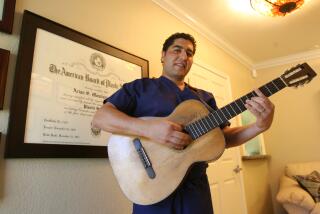Battle Over Beauty : In Changing Face of a Turf War, Cosmetic Surgeons Gain Ground
- Share via
You don’t like the way you look. Or at least you’re not as attractive as you think you could be. To whom do you turn for help?
That depends on whom you ask.
Until recently, if you called the Orange County Medical Assn. and asked to be referred to someone who does face lifts or nose jobs, you would have been put in touch with a plastic surgeon certified by the the American Board of Plastic Surgery Inc.
Today if you call the association, you are as likely or more likely to be referred to a doctor certified by the American Board of Otolaryngology or the American Board of Cosmetic Surgery. This seemingly subtle change of policy is the result of a $8.6-million lawsuit filed by three Orange County physicians against the Orange County Medical Assn. in May of 1985 and quietly settled out of court for considerably less last summer.
“What we have is a turf war based on politics, economics and ego,” said Dr. George Brennan, a plaintiff in the suit against the county association.
The controversy centers on who is best qualified to perform elective, or “unnecessary” plastic surgery--the kind that attempts to make someone within the range of normal appearance look better or younger.
Cut to the bare bones, the warfare involves three types of surgeons.
On one side of the battlefield are doctors represented by the American Society of Plastic and Reconstructive Surgeons--surgeons who deal with all aspects of plastic surgery throughout the body.
On the other side, though there is no formal alliance, are doctors represented by one or both of two other organizations, the American Academy of Facial Plastic and Reconstructive Surgeons and the American Academy of Cosmetic Surgery. The first group does plastic surgery of the face (either repairing deformed or injured faces, beautifying normal faces or doing both). The second loosely knit army of physicians does cosmetic or “appearance” surgery throughout the body.
“The cosmetic surgeon of the face will run circles around the general plastic surgeon,” said Brennan, who serves as vice president of the American Academy of Facial Plastic and Reconstructive Surgery--an organization of otolaryngologists (ear, nose and throat specialists) general plastic surgeons, ophthalmologists, dermatologists and others who specialize in facial plastic surgery.
“My training and my vast amount of clinical experience make me and someone like me much better qualified (to do cosmetic facial surgery) than someone who does two noses a month. . . . General plastic surgeons are trying to usurp territory that simply does not belong to them,” Brennan said.
Dr. Garry Brody, a Downey-based plastic surgeon and immediate past president of the California Society of Plastic Surgeons Inc. (the California branch of the American Society of Plastic and Reconstructive Surgeons) disagrees.
“We don’t consider this a turf battle . . . ,” Brody said. “What it amounts to is who regulates whom. They’re suggesting that quantity relates to quality. But you can do the same thing badly a million times, and it doesn’t mean anything. . . .”
Regulatory Bodies
Brody pointed out that a board-certified plastic surgeon is regulated by the American Board of Plastic Surgery, which in turn is a member of the American Board of Medical Specialties, an organization affiliated with the American Medical Assn.
The Academy of Facial Plastic Surgery is “a reputable group,” and his group has no quarrel with it because it does not claim to credential people,” Brody said.
But a “so-called” cosmetic surgeon, he continued, claims to be certified by the American Board of Cosmetic Surgeons, a “self-designated” board unrecognized by the American Board of Medical Specialties.
“Anyone can go to Sacramento and establish the American Board of . . . left-toe surgeons,” he said. “I have no way of knowing, nor does the public, how carefully the American Board of Cosmetic Surgery is monitored or self-monitored. Whereas anyone can know how well the American Board of Plastic Surgery is monitored.”
Another criticism is that the Cosmetic Board certifies “after-the-fact training,” said Dr. Frederick Grazer, a Newport Beach plastic surgeon and the immediate past president of the American Society for Aesthetic Plastic Surgery--an affiliate of the American Society of Plastic and Reconstructive Surgeons.
Cosmetic surgeons respond that recognition by the American Board of Medical Specialties is “absolutely irrelevant.” “No new board is recognized,” said Dr. Frederick Berkowitz, an Orange County otolaryngologist, cosmetic surgeon and plaintiff in the county association’s case.
Surgery Qualifications
In fact, Berkowitz contends that the Cosmetic Board’s certification process is more stringent in some ways than the Plastic Surgery Board’s.
To qualify for the Cosmetic Surgery Board’s oral and written exams, a surgeon must be certified by another ABMS-recognized board. He or she must have practiced cosmetic surgery for five years, performed 1,000 cosmetic procedures in that period, and 200 within the past year, said Berkowitz, an examiner for that board.
But those who have certification in plastic surgery say the current glut of doctors has physicians on the prowl for new business. As a result, they claim, surgeons who lack a basic foundation in plastic surgery techniques are performing face lifts, nose jobs, hair transplants, chin implants, breast enhancements, fat suctioning and other “appearance” operations.
To be certified as a plastic surgeon, a physician must first complete a minimum three-year general surgical residency or a residency in one of several recognized surgical specialties. Then the surgeon must complete a two- or three-year plastic surgery residency.
In addition to learning aesthetic techniques, a plastic surgery resident learns to reconstruct the features of someone born with a deformity or disfigured in an accident, and therein lie essential lessons about anatomy and physiology, Grazer said.
He added that those lessons prepare the surgeon for the sort of medical emergencies and complications that sometimes crop up in cosmetic operations. So his training makes him better qualified than someone from another specialty “who goes and takes some post-graduate courses--one week at a time--and suddenly becomes a self-designated specialist,” Grazer said.
Argument Over Abilities
“The best aesthetic surgeons and the best cosmetic surgeons, bar none, are those who are the best reconstructive surgeons,” said Grazer.
Those arguments rile Brennan, of Newport. “General plastic surgeons would have you believe they can do surgery on someone’s penis one day, breast the next, cleft lip another day and be better at a rhinoplasty (nose job) than a facial plastic surgeon who only does cosmetic facial surgery,” Brennan said.
To qualify for the American Academy of Facial Plastic and Reconstructive Surgery, a doctor must be board certified by an ABMS-recognized board such as the Board of Otolaryngology--”the second oldest board in the history of medicine.”
“You also have to be a fellow of the American College of Surgeons. There is no more prestigious body of surgeons--this is the upper crust of the AMA,” Brennan said. And he must demonstrate training and clinical expertise in the specialty of facial plastic surgery, Brennan added.
Doctors calling themselves cosmetic or facial plastic surgeons say the Society of Plastic Surgeons is merely trying to wipe out competition.
They accuse plastic surgeons of waging a propaganda war and “smear campaign” to protect the medical “monopoly” they have tried to establish.
Medical Quality Issue
Doctors calling themselves board-certified plastic surgeons berate cosmetic surgeons for the aggressive--some say tacky--advertising campaigns of certain practitioners.
They say medical quality is the real issue in the dispute.
Cosmetic surgeons agree but claim that free enterprise itself is also at stake.
The majority of doctors calling themselves cosmetic surgeons are trained otolaryngologists (ear, nose and throat specialists). But as demand for cosmetic procedures grows, ophthalmologists, dermatologists, gynecologists and other specialists--including board-certified plastic surgeons--are also claiming that title with increasing frequency.
Dr. Richard Webster is a board-certified plastic surgeon who defected to the enemy camp and now serves as president of the American Academy of Cosmetic Surgery. The Boston-based doctor traces the professional schism back decades but says the current wave of fighting began in “the savage ‘70s,” when, he alleges, some plastic surgeons “incited” patients to file malpractice suits against otolaryngologists and other specialists who had performed cosmetic procedures.
As evidence that certified plastic surgeons are waging a crusade against cosmetic surgeons, Webster points to an internal memo, dated 1975, from the executive director of the American Society of Plastic and Reconstructive Surgeons. The memo, which turned up during a Federal Trade Commission investigation into the professional conflict, outlines a strategy to “stall” efforts by surgeons not belonging to that organization to gain peer and public acceptance as plastic surgery specialists.
Denies Stall Tactics
Calling that memo ancient history, Brody said “the FTC was more interested in the commercial aspects of medicine than quality and patient protection.” He pointed out that the person who wrote that memo was no longer with the organization and denied that an official campaign of stall tactics ever existed.
But cosmetic and facial plastic surgeons maintain that a concerted attack is still in progress, and they have filed several lawsuits in recent years over surgical turf.
One example of these battles was the suit filed against the Orange County Medical Assn., in which Drs. Brennan, Berkowitz and Michael Elam accused the association, its 16-doctor board of directors, and Executive Director John J. Rette of unfair restraint of trade, anti-competitive business practices, and violation of state and federal antitrust acts.
The claims arose because the OCMA telephone referral service was referring patients interested in appearance surgery only to board-certified plastic surgeons and because the OCMA refused to list the plaintiffs according to the specialty the plaintiffs themselves designated in its physicians’ directory.
“This was a consumer service, and they were referring the consumer to the least qualified rather than the best qualified,” Brennan said.
A “Release and Covenant Not to Sue” to which all parties consented last July, denies any wrongdoing on the part of the OCMA and does not acknowledge any justification for the doctors’ claims. But the OCMA does agree in the settlement to make accelerated referrals to the three plaintiffs for a period of six months, to pay them $60,000 and to develop a computerized referral system in which participating physicians “self-designate” their specialties.
Details of Document
The document also states that information on the board certification of doctors “not be volunteered” and that telephone operators “be instructed to refrain from commenting upon the significance of board certification as a basis for selection.”
Parties on either side of the Orange County litigation said they had agreed not to discuss the terms of the settlement and refused to comment for publication.


